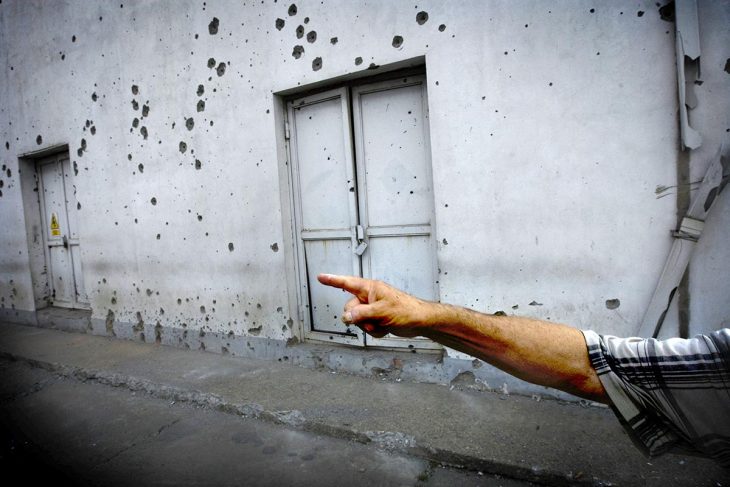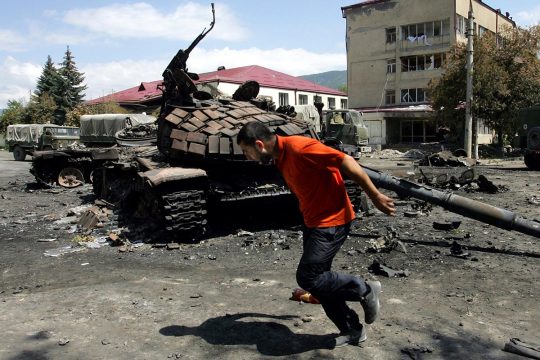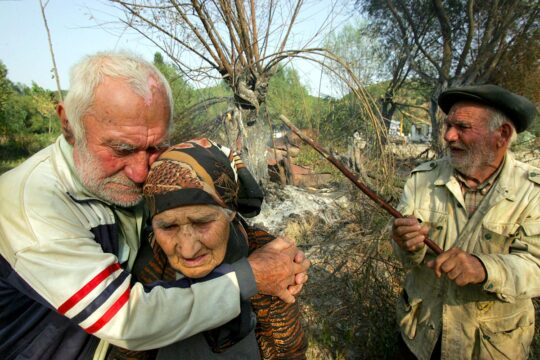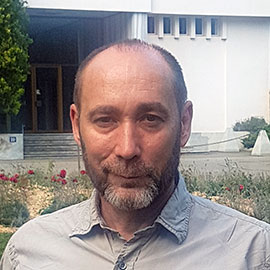JUSTICE INFO: In a tweet after the Prosecutor of the International Criminal Court (ICC) announced that he has requested arrest warrants against three officials from South Ossetia for alleged crimes committed in Georgia in 2008, you wrote: “6 years of youth completely devoted, so many sleepless nights, damaged career & health, alienated colleagues & friends, attacks from intelligence agencies, 4 relocations, constant family trauma, all property & savings gone…in the end it has all come to this.” So in the end what has it come to?
NIKA JEIRANASHVILI: Well, I can’t help but wonder if it was all worth it, you know. Obviously I am happy that there is some movement; we see some results from the investigation. The sad part is that this could have happened three years ago and not six years after the investigation was opened. I even knew about these arrest warrants, at least two of them. I had conversations with the Office of the Prosecutor [of previous prosecutor Fatou Bensouda], advising them to issue those arrest warrants as soon as possible. So this could have been done earlier.
According to you, these arrest warrants were ready three years ago?
Yes, they were ready at least two or three years ago.
Why were they not requested back then?
The logic there was to see if these guys would move somewhere, if they liked to travel, or go on a holiday in one of the European countries, to arrest them. Otherwise it would just be something in the air and nobody would care about it and there would be disappointment because there would be no process. When the pandemic began I suppose the reasoning was these guys are not moving anywhere. And now because of Ukraine everything changed and the new prosecutor just decided to go ahead. Not that anything changed in practice and that these guys would now go anywhere but with this he sent a very clear signal to the perpetrators in Ukraine that ‘I am watching you, you are basically the same people’. He even mentioned Ukraine in his statement on arrest warrants. I am pretty sure that if it wasn’t for the situation in Ukraine in the past two or three weeks the arrest warrants would not have happened.
And yet there doesn’t seem to be any better prospect for the arrest of these three individuals…
Definitely not. It has become even more unrealistic now to arrest those guys.
There are several things to take into consideration. There is a new prosecutor and before he was elected he showed what his vison was. It was: If I am elected, I will make sure that there will be no cases where there might be a chance that somebody in the end is found not guilty as it has happened in some of the cases [before the ICC]. He said: I will try to go ahead with the ones where it is more realistic to succeed in terms of evidence, executing arrest warrants, and [holding] hearings. This also included Ukraine. He knew very well, especially from the Georgian experience, that issuing arrest warrants, say, against Russian generals, is highly unlikely to be executed by Russia of course, but also by [ICC] member states because for them it meant a declaration of war with Russia. That’s why everybody liked his position and to a certain degree agreed with that.
And yet you are saying that Karim Khan is now doing exactly the opposite.
Yes. There was also an argument about resources, financial limitations, and of creating expectations with the victims and re-traumatizing them by promising things that will never really happen. But everything changed with Ukraine. And his position also changed, 180°. And I suppose it’s not only him now. State parties, very powerful ones, the UK first of all – and Karim Khan is also from UK – [are] supporting the investigation of the Ukraine situation since the war started recently. I guess [the prosecutor] felt the pressure from member states. He must have felt that right now that there is nothing more important than Ukraine going on in the world. For him to remain silent would not be correct. He was basically forced to go ahead.
Part of Khan’s realistic prosecutorial approach was to indicate that he wouldn’t go after superpowers, like when he dropped the investigation against US agents in Afghanistan. And yet in Georgia and in Ukraine, it really is about Russia, another superpower.
Exactly. He changed his position. We have to take into consideration that everything really changed two or three weeks ago when the war started in Ukraine. Literally everything that we knew before now happens in a different way. I think he realized this. [In his request for arrest warrants] he mentioned one Russian general – who is now deceased – because if there were only South Ossetian [suspects] everybody would say that he has just found the weakest link in that situation. Mentioning a Russian general and basically saying he would have issued an arrest warrant against him if he were alive is a big signal, especially in Georgia. With this he managed to mention Russia and Russia’s responsibility. It’s also important that he mentioned Russia’s occupation. This is something that matters very much politically here in Georgia, and he mentioned parallels to the Ukraine situation and said he found similar patterns in Ukraine. I think he cannot be more clear than that, that this is all about Ukraine and what’s happening there.
Before, it was almost impossible to imagine [targeting] someone from Russia. Now the situation is different. State parties also realized that dealing with Russia only in diplomatic manner simply doesn’t work anymore because of Russia’s actions. The time has come to treat Russia differently; actually to stop treating Russia differently and to start treating it as we should have done a few years ago. And if there is sufficient evidence against Russian generals, yes, issuing arrest warrants against them and see what happens.
Some analysts worry that this is using the ICC as a weapon in the Ukraine conflict and that this is a mistake. Is it?
Well, it’s been eight years they have had a preliminary examination in Ukraine... It is true that this is a political decision. And I think it’s good the court also realizes that it’s not living in a world where there is no politics around. Of course if there is an international conflict there will be politics around it. I don’t know about the weapon; if it was effective then we could say it is an effective weapon to stop perpetrators from committing crimes. I don’t know if this will be successful and effective regarding Russia…
Are there lessons you wish to draw from the Georgian experience with the ICC that would be relevant to Ukraine?
There is already a lot that we have shared with Ukrainian colleagues, and with the ICC Office of the Prosecutor as well. One of the problems that the Office had in its investigations was the lack of evidence. Because from the moment they got engaged it was already too late – it was several years after the war – some of the key witnesses had already died. And during the preliminary examination period the Office has done almost nothing to secure this evidence which could have been used later in court. Because of that the Office changed its practice in Ukraine. I think they will have less problems.
There is the same aggressive country, Russia, the same people who give orders and ultimately we know who is the decision maker: Putin. I don’t know if the prosecutor will go to the point where he will issue an arrest warrant against Putin himself. It’s a very sensitive issue. We cannot avoid the Ukraine investigation to be politicized one way or another; there is no way to avoid it. It will all depend on what happens in the war, whether there will be an agreement, etc. Let’s say Russia loses this war and there is a change in the Russian administration, then for sure [the prosecutor] will go after Putin himself. If it doesn’t happen it is obviously highly unlikely for him to do something like this. Because again, from a realistic point of view, it’s just impossible: you can’t just go into a bunker in Russia and bring Putin with you to The Hague, it won’t happen.
The three individuals named by the ICC Prosecutor in the Georgia situation are Lt.-Gen. Mikhail Mayramovich Mindzaev who was Minister of Internal Affairs of the de facto South Ossetian administration at the time; Gamlet Guchmazov, who was South Ossetia’s head of the Preliminary Detention; and David Georgiyevich Sanakoev, who was the de facto Presidential Representative for Human Rights of South Ossetia, also known as “Ombudsman”, according to the Prosecutor. How significant are these three individuals?
For Georgians, some aspects were important. Not necessarily the individuals mentioned because they are all from South Ossetia and they are not seen as the main perpetrators: every single person in Georgia knows it was up to the Russian government and administration. It’s not like South Ossetians started all this. So in a way there is disappointment that the Russian administration is not mentioned enough. It is also important that there is nobody from the Georgian side against whom arrest warrants are issued. So in a way people see it as a victory.
I have heard comments from government officials. It’s interesting. The way they portray it is that they have won this case, that this was because of their hard work. But nothing about the execution of the arrest warrants, nothing about asking Russia to arrest those guys and bring them to The Hague, nothing like that. Because the current government officials are very much affiliated with Russia. Every time they try not to do anything that Russia might not like. For example, we are one of the very few countries that are not actually part of the sanctions against Russia right now.
Were there other individuals that you would have expected to be subject to arrest warrants?
I think there was another Russian general, at the time involved with the so-called “peace-keeping mission”. But there are objective reasons, as I said, not having Russians in the arrest warrants: the problem of evidence. In that regard, the prosecutor went in the direction he said he would go. I think he found a very creative way to mention Russia without actually triggering anything from Russia. It was a very smart decision from his point of view.
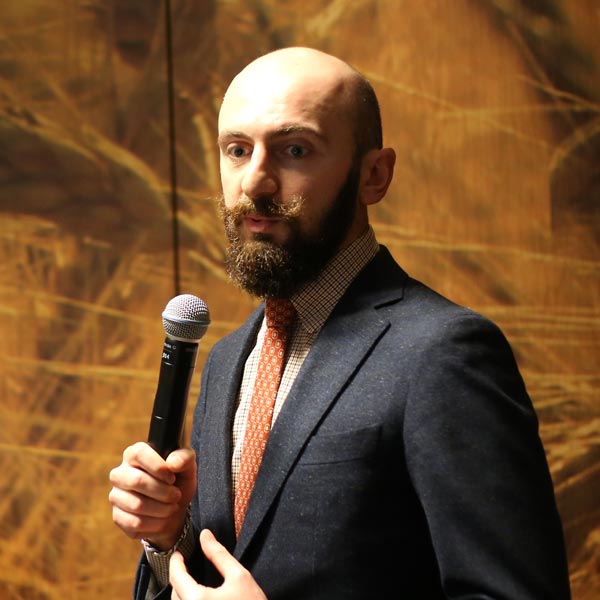
© Syd Boyd / CICC
NIKA JEIRANASHVILI
Nika Jeiranashvili is the Executive Director of Justice International, an NGO that supports ICC investigations and civil society engagement in them.


